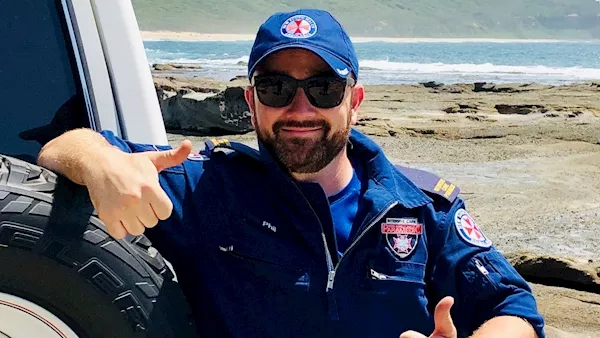By Elaine Keogh
An Irish paramedic working in Australia close to the bushfires has said the rural fire fighters are “unpaid heroes.”
Philip Walker, who worked with the National Ambulance Service in county Louth before leaving for New South Wales in 2013, said, “the nearest fire to me at the minute is at emergency level and (they) are evacuating people out of what you would call suburban areas.”
He lives with his wife Assumpta and their children Ralph (7), Gabriella (6) and Nathaniel (2), near Newcastle which is two hours north of Sydney, and he works as an intensive care paramedic.
Speaking in the early hours of this morning from New South Wales, he said there has not been any rain, no back burning of dead grass, a temperatures of 45 degrees and, “now winds blowing at 30-40km, it is a recipe for disaster.”
Helicopters are taking water from people’s swimming pools to dump onto the fires and some 60 of the 200 bush fires in the region are out of control.
The closest fire to him and his family is about 65 km to the south but two weeks ago “we had fires in small inland towns that would have been some 30km west of where I am living.”

He said the problem with trying to tackle the fires is that it involves vast areas of bushland.
"It is not somewhere you can drive a fire truck to; you can have a two or three day heads up that there is a fire there but you can’t get a fire truck to it. There are no roads into these places, it is like outback.”
The rural firefighters are resourced and funded and he said, “they are highly skilled at what they do. These are specialists who work specifically in these rural areas to fight bushfires and contain bushfires and protect property and life and farms.
You could have 20,000 hectares of a farm here (and) they are specifically trained to protect these types of area in the Australian bushland.
He said they do this for free and “the guys on the ground are volunteers,” of all ages, male and female and they travel hundreds of kilometres to help in other communities too.
He lives with 80 hectares of bushland at the back of his property and he has their passports and other important documentation as well as a weeks supply of clothes for their children, “all packed in a box in the back of my car. The minute we are given the warning (to leave) we just jump in the car and drive.”
“There are days you wake up and you can’t see the sky because it is covered in smoke. There could be a bushfire 50kms away from you and you are totally unaware of it one day and the next day your whole area is smoky, it all depends on the wind.”
He said the fire fighters “are unpaid heroes. They have their own businesses, have own careers. I know people who are GPs, vets, nurses, people who own own bakery is and they are all out doing this.”
He said they cannot be thanked enough for what they are doing and, “They do not want rewards. You see these guys falling asleep at the side of the road when they are taking a break in a field, just rolling their jacket up and making a cushion and having a sleep.”
“They might do 18-20 hour days, have a 3 or4 hour nap and then they are back in the truck again. We are talking around about 2,000 fire fighters currently deployed fighting fires around New South Wales.”
As a paramedic he says he is asked to be on stand by and provide the fire fighters with support and help as they can get dehydrated and become unwell. “We have a very small part to play in comparison to what these guys are doing.”






